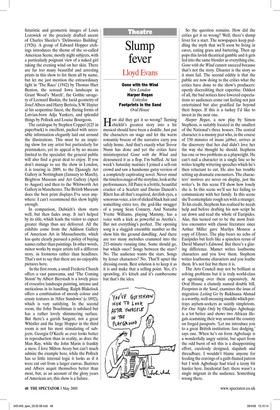Slump fever
Lloyd Evans
Gone with the Wind New London Harper Regan Cottesloe Footprints in the Sand Oval House
How did they get it so wrong? Turning chicklit’s greatest story into a hit musical should have been a doddle. Just put the characters on stage and let the warm romantic breeze of the narrative carry you safely home. And that’s exactly what Trevor Nunn has done and yet the critics have misinterpreted Gone with the Wind and denounced it as a flop. I’m baffled. At last week’s Saturday matinée I joined a sell-out crowd and saw a handsome gutsy version of a completely captivating novel. Never mind the timeless magic of the storyline, look at the performances. Jill Paice is a brittle, beautiful cracker of a Scarlett and Darius Danesh’s Rhett has all that’s required, devilish eyes, a sonorous voice, a lot of slicked black hair and something extra too, the god-like swagger of a young Sean Connery. And Natasha Yvette Williams, playing Mammy, has a voice with a kick as powerful as Aretha’s. But not everything’s perfect. The opening song is a sluggish ensemble number so the show hits the ground dawdling. And there are too many melodies crammed into the 215-minute running time. Some should go, but which ones? Songs between the stars? No. The audience wants the stars. Songs by lesser characters? No. That’ll upset the dressing-room. Best solution is to keep it as it is and make that a selling point. Yes, it’s sprawling, it’s kitsch and it’s cumbersome but that’s the idea. So the question remains. How did the critics get it so wrong? Well, there’s slump fever for a start. The newspapers keep peddling the myth that we’ll soon be living in caves, eating grass and bartering. Then up pops this lavish theatrical gamble and it gets fed into the same blender as everything else. Gone with the Wind cannot succeed because that’s not the story. Disaster is the story so it must fail. The second oddity is that the public are now doing to the critics what the critics have done to the show’s producers: openly discrediting their expertise. Oddest of all, the bad notices have lowered expectations so audiences come out feeling not just entertained but also gratified far beyond their hopes. If this is a turkey I’d like to invest in the next one.
Harper Regan, a new play by Simon Stephens, is suitably located in the smallest of the National’s three houses. The central character is a mumsy prat who, in the course of 150 minutes of inane jabber, arrives at the discovery that her dad didn’t love her the way she thought he should. Stephens has one or two problems as a playwright. He can’t nail a character in a single line so he writes lengthy wittering speeches which he’s then reluctant to cut. He also has trouble setting up dramatic encounters. The characters’ motives are never on display, just the writer’s. In this scene I’ll show how lonely she is. In this scene we’ll see her failing to communicate with her family. In this scene she’ll contemplate rough sex with a stranger. To his credit, Stephens has realised he needs help and before drafting his new script he sat down and read the whole of Euripides. Alas, this turned out to be the most fruitless encounter with classic literature since Arthur Miller gave Marilyn Monroe a copy of Ulysses. The play bears no echo of Euripides but feels like a spineless rerun of David Mamet’s Edmond. But there’s a glaring difference. Mamet writes loathsome characters and you love them. Stephens writes loathsome characters and you loathe them. It’s not fair but there it is.
The Arts Council may not be brilliant at solving problems but it is truly world-class at agonising over them expensively. At Oval House a clumsily named double bill, Footprints in the Sand, examines the issue of migration. Letting Go by Rukhsana Ahmad is a worthy, well-meaning muddle which portrays asylum-seekers as saintly simpletons. For One Night Only by Oladipo Agboluaje is a lot better and shows two African illegals scamming their way around the country on forged passports. ‘Let me introduce you to a great British institution: fare dodging,’ says one. When he’s on form Agboluaje is a wonderfully angry satirist, but apart from the odd burst of wit this is a disappointing effort, carelessly designed, slapdash and threadbare. I wouldn’t blame anyone for feeding the cravings of a guilt-fixated patron but I wish Agboluaje had tried a teeny bit harder here. Incidental fact: there wasn’t a single migrant in the audience. Something wrong there.


















































































 Previous page
Previous page